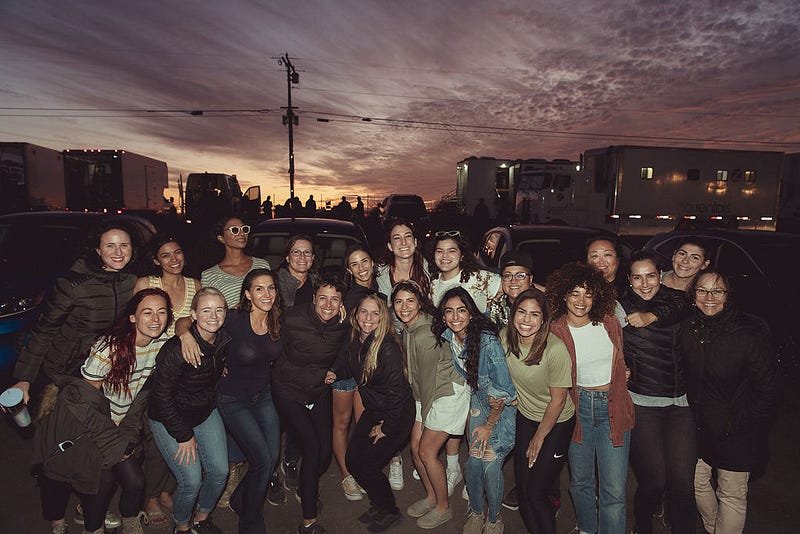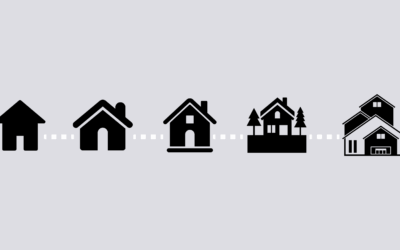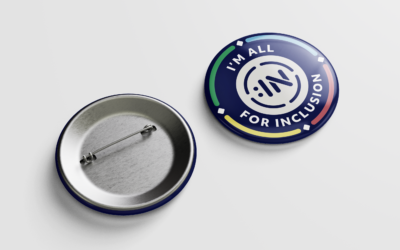This interview is part of our Empowered Women series in partnership with FREE THE WORK, The 3% Movement, The Female Quotient, and TIME’S UP Foundation — a coalition effort to champion more equal and accurate representation of women leading at work, at home, in their communities and beyond. Read more about this initiative here and download images from the Empowered Women collection here.
Laura Busino is Head of Content Production at Ford Motor Company, where she oversees all of the production across Ford’s agencies and develops the guidelines and rules to make sure Ford is always represented consistently. We spoke with Laura about her work, how current leaders can nurture the next generation, and the importance of visual representation.
Hi Laura! Tell us about yourself — how did you get to where you are today? What inspired you to join the team at Ford Motor Company?
Do you know the cliché “You gotta be lucky to be good and good to be lucky?” Well, I think my career embodies that. I was lucky to get into advertising in the first place, but then I made the most of it once I got here. I did not go to school for advertising or production — it was never my lifelong dream. Along the way, I kept setting north stars for myself and figuring out (with a combination of luck and skill) how to get there.
Whenever I speak to someone who is fresh out of college and looking for a job, I always say the same things. It only takes one person to call you back and make you an offer, so get your foot in the door somewhere and start making that opportunity into what you want it to be. I was working in retail after school and figured out that a career as a stylist wasn’t going to pay the bills anytime soon. I called a friend I had met (at a bar) during college who happened to be freelancing at J Walter Thompson. He walked down the hall to ask them if they had any open jobs. Next thing you know, I start my career in advertising. I was answering the phones and doing expense reports for the Executive Creative Director. I started to make friends with the higher ups that would come and go from his office. Through those friendships, I asked to organize the agency Christmas party. I started a group called “The Head Shop” which was a monthly happy hour to talk about what inspires us. Through all of the exposure someone finally asked me what I wanted to do “when I grow up.” After an extremely short and failed attempt at being a copywriter (hardest job ever), I thought about all of the “cool” looking expense reports I did for the ECD when he was in LA. I thought I could get used to staying in those nice hotels in Santa Monica. So, I asked to be trained as a producer. Boom. Next thing I know +20 years, I am at Ford.
Luck certainly drove my being in advertising in the first place, but my most recent move to the brand side was driven by conversations about where the industry was going. I started looking around for opportunities to grow outside of an agency. There were so many things that frustrated me at the agency level. And I kept making these big statements like “If I was the client, I’d do this. . .it would be so much more efficient, or smart, or better.” So, I took the job at Ford to test if I had the chops to make the changes I’d been talking about for so long.
Tell us more about your role as Head of Content Production at Ford — what initiatives do you oversee and what’s a day on the job like for you? What have been some of the most memorable projects you’ve worked on?
That title is a bit of a misnomer, as we aren’t producing anything in-house. We oversee the production that Ford US does across all of it’s agencies. We develop the guidelines and rules and make sure that everyone is representing Ford in the same way. To that end, we can make small changes to how we do business and it can make big changes down the line. I have to give a shout out to my team of incredibly strong and capable women who are also insanely great humans: Danielle Zubriski and Jenn Suttlemyer.
When I started the job at Ford in May of 2019, I NEVER could have predicted the world we all live in today. But, I thank my lucky stars (there’s the luck again) to be at a company like Ford during COVID and this time of social unrest. I feel so lucky to have been able to keep working during this time and Ford has offered such a range of support to their employees. Also, I feel like Ford is in a renaissance right now. They are open to new ideas and ways of working. To that point, I have gotten nothing but support for Ford signing on to be a founding partner in FREE THE WORK. Ford is also supportive of the Streetlights organization and is looking to increase our involvement there. And, this is all before May of 2020.
Since May, I’ve been spending time figuring out a thoughtful way that brands can use their power to create real change. I am a firm believer in training, mentoring, and education to create the world I want for my kids. How can we implement programs in order to expose and mentor groups of people who wouldn’t typically have access to professions such as directors, line producers, EPs, production coordinators, 1st ADs, 2nd Ads, gaffers, etc.? This way, the whole production community can match and represent the people that live in this country. And by the way, the same sentiment goes for the brands themselves and the agencies that typically go between the brands and the production community. We all need to be held accountable for our hiring practices.

Throughout your career, have you had a mentor that helped support your growth and development?
I have only had one official mentor. Before that, I’ve had some very important lessons taught to me along the way. When I first moved into production at JWT, I worked for an Executive Producer whose name is Terry Brogan. He always told me two things: “If the project is great and the client loves it, the creatives are a genius. If anything goes wrong, it’s the producer’s fault.” BUT then he would say, “Don’t forget. At the Oscar’s, it’s not the director or the writer who wins the Oscar for best picture. It’s the producer who goes up for the trophy.” I have thought about that so many times and it’s something I’ve always shared with young producers. I am certainly a “behind the scenes” type of person. But, sometimes that can seem like a thankless job — even though you’ve been working all night and all weekend and really giving it blood, sweat, and tears. I try to make sure that I take the time to thank the people who do the work. To that same point, another producer I learned a lot from, Paul Golubovich, always made a point of knowing EVERY person’s name on a set, or in the post facility, or at the store he got his tea from. That makes such a difference. And, that’s not a work lesson — that’s a life lesson. Making sure that you pause and acknowledge the people around you, that they feel seen and heard, that you treat them with kindness — that’s probably one of the most important lessons.
As for my official mentor, I asked the COO of my old agency to mentor me and show me the operational/business side of advertising. I thank goodness for Jeanne Crockett and what she shared with me all the time. I worked with her weekly for a couple of years. It was my own business school. And it gave me the back office agency context I needed to help solve some of the business issues I face today.
I am still looking for my growth guru. If you’re out there. . .
What are a few key ways current leaders can help nurture the next generation of women in leadership, particularly in creative roles?
I think for years many men have been thrown into the deep end and been given big chances to prove themselves. Somehow women have had to take baby steps. Part of this might be that we need to teach women how to have the hard conversations. After being a leader of both men and women, I have been astounded to see how differently women approach the difficult conversations (even when speaking to another woman.) There should be training and mentorship to focus on this. I don’t think women understand generally speaking how much more aggressive men are for raises, opportunities, and promotions. I do not know if this comes from our being wired differently or brought up differently, but it is there. I see it in myself and sometimes really have to fight my instincts that tell me I will get what I deserve because it’s the right thing — without having to fight for it. You need to be your own advocate.
At Noun Project, we believe that visual language has the power to shape, reinforce and change perceptions. What are your thoughts on the importance of visual representation when it comes to supporting more women in leadership roles across industries?
Now you are touching on a topic near and dear to me. I have a six year old daughter and I have been realizing how strong her perception is of the visual cues around her. Every image of a woman she sees, I can almost see it imprinting in her brain. She soaks in what is appropriate, possible, and “cool” from what she sees girls and women wearing on the streets. Heck, it’s summer time. What is her take away of the itty bitty string bikinis she sees around her at the lake? I am not sure it’s the power message I’m hoping to share with my daughter. All women and girls need to see strong women in positions of power and leadership so they know it’s possible. Forget possible — probable. Once we see these representations enough, no one will even question “Can I do that if I’m a woman? Do women do that job? Is it OK?” I don’t just want the answer to all of those answers to be “yes” — I don’t want the question to be in any woman’s head in the first place.
When you look to the future, what inspires you and what are you most excited about?
I think, like everyone, I am inspired by the social movement around us. I’m very terrified because I feel like if we don’t get change now, we might not ever. And what would that say about us as humans if we don’t stop and change our behaviors? I am inspired by the number of people I talk to that are now realizing that just talking about what you want the world to be in five years is not enough. You have to get up and make that world. I have talked the talk for a long time. But what have I done? It’s a scary question. I know for me, the answer is “not enough.” But that won’t be my answer anymore.
I am also inspired by creative people. I love being around them. That’s why I like advertising so much. It’s like a bunch of grown kids, going to work, but getting to flex their creative muscles all day. I am not creative — but I like to feel creative by association. Just being around that energy is a gift.
What advice would you give to women in the workplace as they navigate the path to leadership?
Be yourself. Don’t try to act like the man in power. Don’t try to act like your boss or the person who hired you. If you are yourself, people respond to that. I think that’s the only way you can get honesty and trust out of the people around you. And you will become more confident in yourself. Hopefully, that confidence will propel you to go after the things you have worked for and deserve. And you will have to advocate for yourself all along the way. And never forget the names of the people who get your coffee. They could be your boss one day!
About FREE THE WORK
FREE THE WORK is a nonprofit initiative dedicated to identifying systemic inequalities in film, television, advertising, and media, and finding actionable solutions to expand access for underrepresented creators.
This mission is supported by FREE THE WORK’s field work & advocacy, editorial content, events, partnerships and curated talent-discovery platform.




